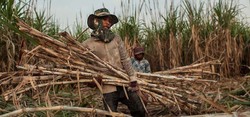
by Zsombor Peter
Three local NGOs have filed a complaint with international sugar industry group Bonsucro for readmitting Thai sugar giant Mitr Phol even though thousands of families forced off the company’s former plantations in Oddar Meanchey province have yet to be fully compensated.
Membership in the group confers a sort of stamp of approval indicating that a company practices sustainable sugar sourcing. Bonsucro readmitted Mitr Phol Group (MPG) late last year after the company resigned from the group in 2012, before Bonsucro could investigate a complaint made the previous year regarding human rights violations on MPG’s three sugarcane plantations in the northwest province.
Objecting to Mitr Phol’s return, Licadho, Equitable Cambodia and Inclusive Development International filed a new complaint with Bonsucro on Friday.
“Based on these three illegal [plantations], MPG committed numerous, grave violations of Bonsucro’s objectives and principles, Cambodian law and its international human rights responsibilities,” they write. “In plain terms, MPG seriously deepened the impoverishment and suffering of a large number of already very poor people, and now MPG has a responsibility to do everything within its power to remedy the damage it caused.”
In a letter accompanying the complaint, David Pred, the managing director of Inclusive Development, said Bonsucro had promised in 2012 that Mitr Phol would not regain its membership without going through the group’s formal complaints process.
“Unless Bonsucro is ready to seriously address this case and use its leverage to deliver meaningful redress to the long suffering families in Oddar Meanchey whom Mitr Phol robbed, it will be utterly discredited as a sugarcane certification body,” he writes.
Bonsucro did not reply to a request for comment about the new complaint.
Mitr Phol also did not reply to a request for comment, but has previously denied any wrongdoing. In late 2014, the company decided to abandon all three of its Cambodian plantations after having cleared the land but grown almost no sugarcane. At the time, local officials said the company pulled out because of the bad press the plantations were generating.
Rights groups accuse Mitr Phol of forcing some 2,000 families off their farms and out of their homes since 2008, often with the help of local authorities who burned down their houses and threw some people in jail for trying to resist. Last year, after a lengthy investigation, the National Human Rights Commission of Thailand corroborated the claims.
The evicted families say they should get their land back now that Mitr Phol has pulled out.
“The sugar company left a long time ago, but the villagers whose farms and homes were stolen by the company have not been able to get their land back. Now it’s just empty, covered with growing grass,” said Huoy Mai, who lost land to the company. “Our farms were lost and our homes were burned down in 2009, so it’s time to give us back the land.”
She and about 200 other families filed a formal request for the return of their land with authorities in Samraong City last week. Deputy governor Ty Kamol said many of the evictees had already been compensated and that authorities were assessing claims from the rest.
(Additional reporting by Kuch Naren)












